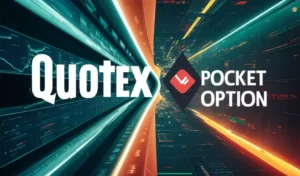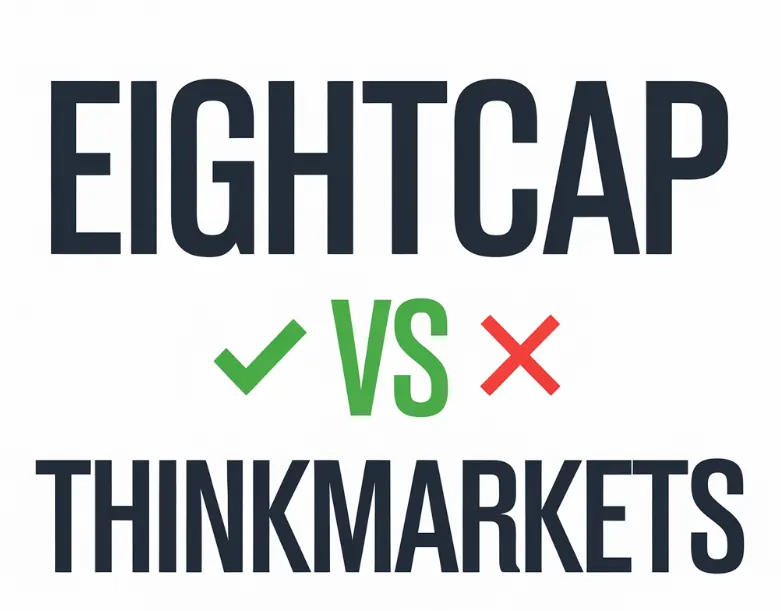
When it comes to choosing the right broker for your trading journey, the decision can often feel overwhelming. With so many options available, finding a platform that aligns with your trading goals, preferences, and budget is crucial. Two names that frequently pop up in the world of online trading are Eightcap and ThinkMarkets.
Both brokers have carved a solid reputation in the industry, offering competitive features, advanced trading platforms, and a variety of instruments to trade. But how do they stack up against each other? If you're a seasoned trader looking to expand your portfolio or a beginner trying to find the perfect starting point, understanding the differences between these two brokers is key.
In this article, we’ll dive into an in-depth comparison of Eightcap vs ThinkMarkets, covering everything from their regulatory standing and fees to their platform offerings and market access. By the end, you’ll have a clearer picture of which broker suits your trading style best. Let’s get started!
When comparing Eightcap and ThinkMarkets, both brokers offer solid trading experiences, but with distinct advantages. Eightcap stands out with its extensive cryptocurrency CFD offerings, showcasing over 120 crypto derivatives markets. It also provides tight spreads from 0 pips and high leverage up to 1:500 for certain clients. ThinkMarkets, on the other hand, shines with its proprietary ThinkTrader platform and in-house copy trading service, ThinkCopy.
Both brokers are regulated by reputable authorities, with Eightcap under ASIC and FCA oversight, while ThinkMarkets adds FSCA regulation to its ASIC and FCA licenses. In terms of asset selection, ThinkMarkets offers a broader range with over 4,000 CFDs across seven sectors. However, Eightcap edges out in terms of lower average trading fees and superior trading tools. Ultimately, the choice between the two depends on your specific trading needs and preferences.
Eightcap
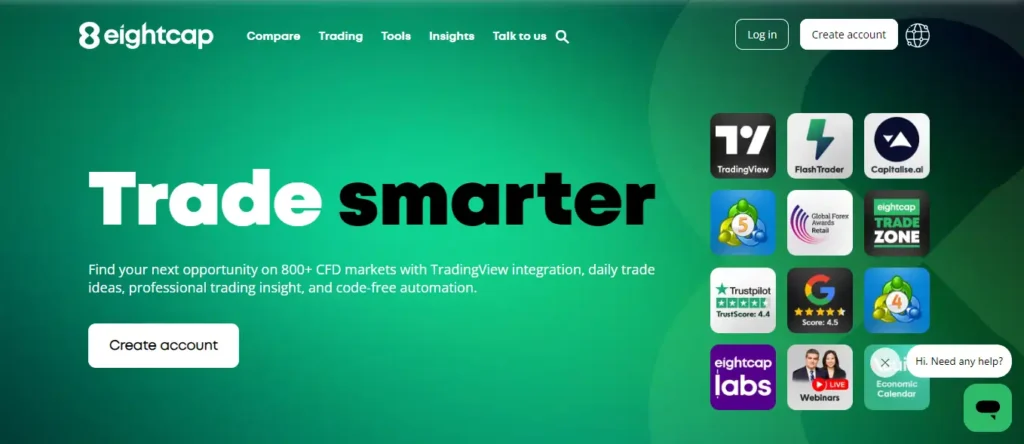
Eightcap, established in 2009 in Melbourne, Australia, has built a strong foundation in the forex and CFD trading industry. The broker operates under strict regulatory oversight from multiple prestigious authorities, including ASIC (Australian Securities & Investment Commission), FCA (Financial Conduct Authority), CySEC (Cyprus Securities and Exchange Commission), and SCB (Securities Commission of The Bahamas).
Operating from its headquarters at The Rialto, South Tower in Melbourne, Eightcap has earned notable recognition, including the Global Forex Awards' “Global Forex Broker of The Year – 2023” and “Best CFD Broker Australia – 2022“. The broker maintains a Trust Score of 85, reflecting its commitment to regulatory compliance and client security.
With five global offices, Eightcap provides traders access to over 800 financial instruments, including forex, indices, commodities, and shares. The broker emphasizes client fund protection through segregated accounts and maintains stringent compliance with international financial regulations.
ThinkMarkets
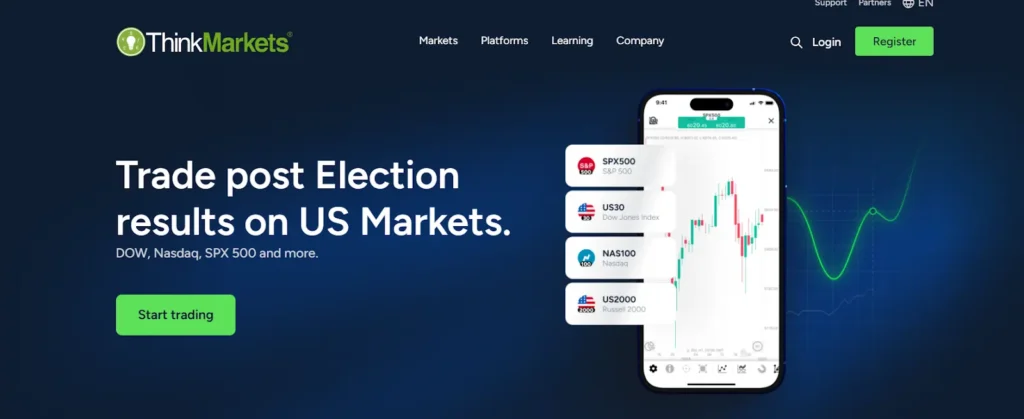
ThinkMarkets, established in 2010, maintains robust regulatory compliance under multiple prestigious authorities, including the FCA (UK), ASIC (Australia), CySEC (Cyprus), JFSA (Japan), FSA, CIMA, and FCSA. The broker's strong regulatory framework ensures client fund protection, including £85,000 protection through FSCS.
Operating from dual headquarters in London and Melbourne, ThinkMarkets has earned notable industry recognition. Their accolades include “Best FOREX Trading Experience,” “Best FOREX Trading Innovation” at the 2017 UK FOREX Awards, and “Best Value Broker in Asia” at the 2020 Global FOREX Awards. Most recently, their proprietary platform ThinkTrader received the “Best Trading App for Analysis” award from TechRadar.
The broker serves clients from over 180 countries through offices spanning Asia-Pacific, Middle East, North Africa, Europe, South America, and South Africa. This global presence, combined with their regulatory compliance and industry recognition, establishes ThinkMarkets as a trusted name in the online trading industry.
Trading Platforms ➛ Eightcap vs ThinkMarkets
| Broker | Available Platforms |
|---|---|
Eightcap | MetaTrader 4, MetaTrader 5, TradingView, Capitalise.ai |
| ThinkMarkets | MetaTrader 4, MetaTrader 5, ThinkTrader |
Eightcap distinguishes itself with a unique approach, offering an AI-powered economic calendar and the FlashTrader EA to enhance the MetaTrader experience. ThinkMarkets counters with its proprietary ThinkTrader mobile platform, which has received recognition as the “Best Mobile Platform”
Trading Instruments ➛ Eightcap vs ThinkMarkets
| Broker | Forex Pairs | Cryptocurrencies | Total Instruments |
|---|---|---|---|
Eightcap | 56 pairs | Over 200 crypto CFDs | Around 900 CFD symbols |
ThinkMarkets | 43 pairs | 21 cryptocurrencies | Around 4,000 tradeable symbols |
Eightcap particularly shines in cryptocurrency offerings, winning the 2024 Annual Award for #1 Most Cryptos. ThinkMarkets provides a broader range of overall trading instruments.
Fee Structure Analysis ➛ Eightcap vs ThinkMarkets
Eightcap's Fee Model
Eightcap provides two distinct account types with different fee structures. The Raw account charges a commission of $3.50 per lot per side ($7.00 round trip) with extremely tight spreads starting from 0.06 pips. The all-in trading cost for EUR/USD averages around 0.76 pips, making it quite competitive in the market. The Standard account, while commission-free, has higher spreads starting from 1.0 pips, resulting in overall higher trading costs.
ThinkMarket's Fee Model
ThinkMarkets offers a tiered fee structure across different account types. The Standard account features commission-free trading with spreads starting from 0.4 pips, though the average forex spread is around 1.2 pips. The premium ThinkZero account requires a higher minimum deposit of $500 and charges a commission of $3.50 per lot, but offers raw spreads starting from 0.0 pips.
Cost Comparison ➛ Eightcap vs ThinkMarkets
When comparing the two broker's most competitive offerings, Eightcap's Raw account generally proves more cost-effective for regular traders. While both brokers offer similar commission structures in their premium accounts, Eightcap's combination of tight spreads and reasonable commissions results in lower overall trading costs. However, ThinkMarket's Standard account might be more attractive for casual traders who prefer a commission-free structure despite slightly wider spreads. Neither broker charges inactivity fees or internal withdrawal fees, though third-party payment processing costs may apply.
Account Features Comparison ➛ Eightcap vs ThinkMarkets
Eightcap Account Structure
Eightcap offers three distinct account types with a uniform minimum deposit of $100. The Standard Account features commission-free trading with spreads from 1.0 pips, while the Raw Account provides raw spreads starting from 0.0 pips with a $3.50 per side commission. The TradingView Account caters to traders preferring the TradingView platform interface. Maximum leverage varies by jurisdiction, reaching up to 1:500 for professional accounts, though ASIC-regulated accounts are limited to 1:30.
ThinkMarkets Account Structure
ThinkMarkets provides a more diverse account structure with varying entry points. The Standard Account requires a $250 minimum deposit, while the premium ThinkZero Account needs $500 and offers raw spreads from 0.0 pips. The ThinkTrader Account has the lowest entry point at $50. A unique Mini Account is available with just $10 minimum deposit, featuring dynamic leverage up to 1:2000. All accounts offer maximum leverage of 1:500 outside Europe, with comprehensive platform access including MT4, MT5, and the proprietary ThinkTrader platform.
Educational Resources Comparison ➛ Eightcap vs ThinkMarkets
Eightcap's Educational Offering
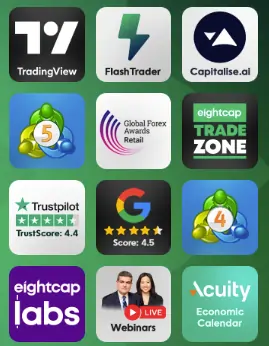
Eightcap has enhanced its educational content through Eightcap Labs, which features a collection of written articles covering fundamentals and trading strategies.
The platform offers approximately 74 articles and a dozen educational videos, including archived webinars from their TraderFest series focusing on CFDs and forex trading. However, the platform lacks organized courses, progress tracking features, and experience-level filtering options.
ThinkMarket's Learning Resources
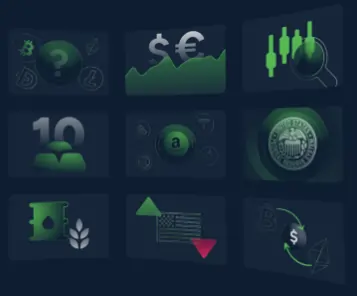
ThinkMarkets delivers a more comprehensive educational ecosystem through its Trading Academy, featuring 88 detailed forex articles and an extensive video library.
The platform stands out with its innovative Trader' s Gym, a unique tool allowing traders to test strategies on historical data across 4,000 instruments.
Their educational content includes beginner-friendly user guides, recorded webinars, and regular market analysis sessions, all organized by experience level.
Key Differentiators
While both brokers provide educational resources, ThinkMarkets offers a more structured learning environment with practical tools like the Trader's Gym and comprehensive video tutorials. In contrast, Eightcap's educational offering, though improved, remains limited in scope and lacks the interactive elements and systematic organization found in ThinkMarket's platform
Quenching Common Queries Related to EightCap Vs ThinkMarkets
Which Broker Offers more Trading Instruments?
ThinkMarkets provides around 4,000 tradeable symbols, offering a broader range of instruments compared to Eightcap's 900 CFD symbols.
What are the Minimum Deposit requirements for Both Brokers?
Eightcap requires a uniform $100 deposit, while ThinkMarkets offers flexible options from $10 to $500 across different account types.
Which Platform is better for Cryptocurrency Trading?
Eightcap wins with over 200 crypto CFDs and the 2024 Annual Award for #1 Most Cryptos trading platform.
How many Regulatory Authorities oversee these Brokers?
Eightcap is regulated by 4 authorities, while ThinkMarkets is supervised by 7 prestigious financial regulatory bodies globally.
What Trading Platforms do Eightcap and ThinkMarkets Offer?
Eightcap provides MetaTrader 4/5, TradingView, and Capitalise.ai, whereas ThinkMarkets offers MetaTrader 4/5 and ThinkTrader platforms.
Which Broker has more Comprehensive Educational Resources?
ThinkMarkets offers a more structured learning environment with 88 articles, video library, and the innovative Traders' Gym tool.
What is The Maximum Leverage Offered by these Brokers?
Both brokers offer up to 1:500 leverage outside Europe, with ASIC-regulated accounts limited to 1:30.
How many Forex Trading Pairs do these Brokers provide?
Eightcap offers 56 forex pairs, while ThinkMarkets provides 43 forex trading pairs.
Do these Brokers Charge Inactivity or Withdrawal Fees?
Neither Eightcap nor ThinkMarkets charge inactivity or internal withdrawal fees, though third-party processing costs may apply.
Which Broker is more Cost-effective for Regular Traders?
Eightcap's Raw account proves more cost-effective with tight spreads and reasonable commissions compared to ThinkMarkets.
Which One Grabs the Title?

After a comprehensive analysis, both Eightcap and ThinkMarkets emerge as robust trading platforms with unique strengths. Eightcap stands out for its exceptional cryptocurrency offerings, competitive pricing, and tight spreads, making it an excellent choice for traders focused on crypto CFDs and cost-effective trading. Its global regulatory compliance and strong market reputation provide additional confidence.
ThinkMarkets, conversely, offers a more diverse trading experience with broader instrument range, more sophisticated educational resources, and innovative features like the Trader's Gym. Their multi-platform approach and lower minimum deposit options make them attractive for traders seeking flexibility.
The ultimate choice depends on individual trading priorities. Cryptocurrency enthusiasts might prefer Eightcap, while market traders could find ThinkMarkets more appealing. Both brokers demonstrate commitment to trader support through robust regulatory frameworks, competitive fee structures, and continuous platform improvements.
Traders should carefully evaluate their specific needs, risk tolerance, and trading objectives before making a final decision. Regardless of choice, both platforms represent high-quality options in the competitive online trading environment.

